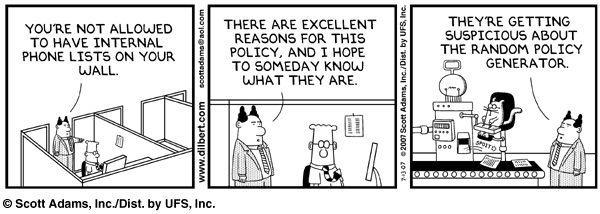A recent “encounter” with the IT team of a large company that I consult for, left me feeling angry, frustrated and demeaned. I had to get a technical research, analysis and prototype job done (1) quickly, (2) efficiently, (3) economically and (4) with the agility of a startup. Instead, browsing, downloading and installation policy restrictions impeded me from achieving 3 of the 4 objectives. The all-to-familiar phrase of “you need to get permissions from the business, IT and reporting managers” made me grit my teeth and conjured nightmares of dealing with fat, lazy, corrupt, paan-chewing, government employees.
I’ve helped agile startups achieve their vision, and consulted on individual projects for small, medium and large companies. This has given me the priceless exposure of having seen, experienced and drafted the policies that these companies use to interact with their employees. I’ve even helped hire the kinds of employees that these companies think they “need”. So I’m not unfamiliar with the practice of having employees get approvals for everything, from browsing to downloading/ installing, to taking time off work or working from home, to “requisitioning” whiteboard markers (!!) and much more.
I call this the “Corporate Obstacle Course Syndrome“.
The gamut of employees, from freshers to experienced folks and managers, are all made to run through obstacle courses in order to achieve their objectives (with the glaring exception of senior management). Every “big” company I’ve worked with, spoke to or heard about, treats all its junior and mid-level employees as criminals, erecting IT, HR and administrative policy barriers that impede their progress and agility. Employees have to jump through frustrating, mentally exhausting and time-consuming hoops of approvals, permissions, clarifications and clearances to get their jobs done.
Here’s the kicker: not all employees deserve to be treated that way; typically, a minority of employees in a company are “bad apples”. Those folks tend to waste time in office, browsing social sites or porn, downloading music or watching videos, hanging around a pantry or cafeteria, loitering around the water cooler, spending excessive amounts of time on personal calls, playing foosball/ carrom/ games, or spending too much or too little time at work without getting the job done (interesting infographic here on how people spend their time at work). The Hindustan Times published an article on poor Indian work ethics last year, that’s worth reading. The rest of them are genuinely hard-working, caring, diligent employees with integrity and love for their company and their job.
Unfortunately, managements of most large companies and their HR/IT/admin departments don’t differentiate between the slackers and the keeners, and instead take the lazy route of indiscriminately “carpet bombing” all their employees – good and bad – with restrictive, unproductive and often degrading policies. These policies of restrictions and approvals do nothing to change the nature of goldbrickers but demoralize the assiduous doers.
Here’s a thought for the management and the HR/IT/admin departments of companies:
If an uncomfortably large percentage of your workforce (>15%)is engaged in “subversive” activities some or most of the time, so that you have to curb their freedoms, your problem may not be the policies of managing your human resources, but instead your recruitment team and its hiring DNA. Chances are that your recruitment teams – technical, functional, business and HR – are hiring substandard people – people with character flaws, people who are lazy, people who are under-qualified, people who are not dedicated to your company, people who are not dedicated to their jobs, or people who don’t share or understand the company’s vision and mission. Sadly, the quality of the recruiters often – if not always – matches the quality of the hired employees.
Not surprisingly, startups suffer less from this syndrome because they hire cautiously and correctly (the kind of people that mirror their own vision of what their startup should be like), rarely have large or separate HR/IT/admin departments and rely on their teams’ leaders – or the members themselves – to keep the everyone engaged, busy and ethical.
What are some of the side-effects of this syndrome?
- Increased operating costs: The “goof-offs” might come cheaper than the high performers, but in the long run, they cost the company far more in unproductive/wasted hours, excessive operating/maintenance costs and lowered/lost reputation with their clients.
- Lowered industry reputation: In the carnage resulting from Orwellian policies, the stars of the company rapidly become disillusioned and leave, thus causing greater damage to the productiveness and reputation of the company.
- Decrease in productivity and quality: The slow build up of poorly performing employees changes the DNA of the company from one of agility and integrity, to one of slothfulness and disgrace.
Is there a solution?
- Hire exceptional leaders (managers, team leads) with solid integrity. Let them hire and pick their teams of people who mimic their – and your – values.
- Reduce the HR department’s size and change its responsibilities to enabling the resources/people of the company, rather than managing and restricting them. Perhaps it’s time to rename this department to “Human Resource Enablers”.
- Don’t compromise on the cost and quality of people; doers love the job and the company’s values, slackers only love the ambiance and facilities.
- Encourage and enable everyone – from the junior-most members upward – to try something new and different that grows the company; you’ll be surprised at how much people want to contribute to the success of your organization, if given a chance.



it is really awesome you have taken clear cut concept in eyes what are really happening in the corporate world , your pros and cons are really awesome .